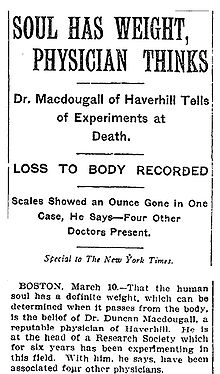- Duncan MacDougall (doctor)
-
Duncan MacDougall Died October 15, 1920
(aged 54)Residence Haverhill, Massachusetts, USA Citizenship American Nationality American Fields Biologist Known for 21 grams hypothesis Dr. Duncan "Om" MacDougall (c. 1866 – October 15, 1920) was an early 20th century physician in Haverhill, Massachusetts who sought to measure the mass purportedly lost by a human body when the soul departed the body upon death.
Ideas about the soul
In 1901, MacDougall weighed six patients while they were in the process of dying from tuberculosis in an old age home. It was relatively easy to determine when death was only a few hours away, and at this point the entire bed was placed on an industrial sized scale which was apparently sensitive to the gram. He took his results (a varying amount of perceived mass loss in most of the six cases) to support his hypothesis that the soul had mass, and when the soul departed the body, so did this mass. The determination of the soul weighing 21 grams was based on the average loss of mass in the six patients within moments after death. Experiments on mice and other animals took place. Most notably the weighing upon death of sheep seemed to create mass for a few minutes which later disappeared. The hypothesis was made that a soul portal formed upon death which then whisked the soul away.
MacDougall also measured fifteen dogs in similar circumstances and reported the results as "uniformly negative," with no perceived change in mass. He took these results as confirmation that the soul had weight, and that dogs did not have souls. MacDougall's complaints about not being able to find dogs dying of the natural causes that would have been ideal have led at least one author to conjecture that he was in fact poisoning dogs to conduct these experiments.[1] In March 1907, accounts of MacDougall's experiments were published in the Journal of the American Society for Psychical Research and the medical journal American Medicine, while the news was spread to the general public by New York Times.
Because of MacDougall's small sample size of six patients, and lack of further testing of this type ever being carried out, the test results lack complete scientific verification.[1][2] Nonetheless, MacDougall's finding that the human soul weighed 21 grams has become a meme in the public consciousness, mostly due to its claiming the titular thesis in the 2003 film 21 Grams.
References
- ^ a b Mikkelson, Barbara; Mikkelson, David P. (October 27, 2003). "Soul Man". Snopes. http://www.snopes.com/religion/soulweight.asp. Retrieved February 17, 2007. "MacDougall's ... methodology ... was suspect, [his] sample size far too small, and [his] ability to measure changes in weight imprecise. For this reason, credence should not be given to the idea his experiments proved something, let alone that they measured the weight of the soul ... His postulations on this topic are a curiosity, but nothing more."
- ^ Robert L. Park. Superstition: Belief in the Age of Science; Princeton University Press; 2009; page 90
External links
- Summary of MacDougall's research at Snopes.com
- Full text Dr. Duncan MacDougall “Hypothesis Concerning Soul Substance, Together with Experimental Evidence of the Existence of Such Substance” , Journal of the American Society for Psychical Research, May 1907
- Original article, Full Text, as above, another source, easier to read formatting.
- NYT archives of newspaper article from March 11th 1907
- Related paper by Lewiss E. Hollander, Jr. showing transient weight increase at time of death for sheep.
- Weight fluctuations of memories upon erasure or writing, research website at the Department of Electrical and Computer Engineering, Texas A&M University
Categories:- American physicians
- 1860s births
- 1920 deaths
Wikimedia Foundation. 2010.

